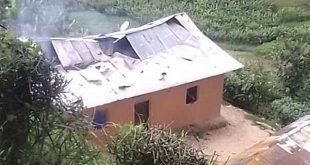
Kampala, Uganda | THE INDEPENDENT | Government has been tasked to recover the payment made to ROKO Construction totaling 15.72 billion Shillings irregularly paid in regard to the Nakawa-Naguru land.
The payment is deemed irregular because claims by third parties against government were not allowed and ROKO could only claim against its client OPEC.
This decision taken by Parliament on Wednesday followed the adoption of a report by the House Adhoc Committee chaired by Kazo County MP, Dan Kimosho that has been investigating the distribution of Nakawa-Naguru land.
“Government should recover the payment made to ROKO Construction, the settlement agreement should not be implemented by both parties and the IGG should investigate further this matter with a view to bringing out any wrong doing,” parliament recommended.
Part of the 7 terms of reference that were given to the committee by Speaker of Parliament, Anita Among was to ascertain the various claimants, the nature of claims they have in the land, the basis of such claims and further establish the genuine ownership of the disputed Nakawa-Naguru estate land.
The committee was also tasked to examine the status or fate of the former occupants in the Nakawa-Naguru land, in light of the ongoing disputes over the land owned by government under the Uganda Land Commission.
Speaker Among wondered why ROKO which had a contract with the land developer was paid by government. She also questioned why a third party benefited yet there was an opinion by former Attorney General William Byaruhanga that third parties had no claim on government.
Kiryowa Kiwanuka, the Attorney General said that cabinet made a decision that people who had developments should be compensated. But, Among said that ROKO was not a sitting tenant at Naguru.
Uganda Radio Network- URN learnt that the Land Commission allocated 2 acres of land to ROKO Construction Company Limited and in allocating the land; they considered the 1.7 acres on which ROKO had initially constructed a slab for OPEC Prime.
ROKO also received compensated worth 15.72 billion in lieu of any interest they held in 2 acres earlier allocated to them, inclusive of the slab. This figure is inclusive of 87 percent interest rate per annum.
Kimosho observed: “There were irregularities in signing and effecting payments to ROKO as reflected in the Deed between government and ROKO. Whereas there was a Presidential directive to effect payment to ROKO Construction Company in a letter dated 20th September 2021, it should have been done within the law.”
Surprisingly, Kimosho said that the Secretary to Treasury, Ramathan Ggoobi, who signed the Deed of Settlement and Assignment on behalf of government, made payments to ROKO on 18th October 2021 before the Deed of Settlement and Assignment was signed on 19th November 2021.
Kimosho reveals that in his interaction with the committee, Ggoobi said that he was implementing the presidential directive which stipulated that he should effect payments immediately.
He adds that the land allocated to ROKO should be revalued taking into account the appreciation in value and the fixtures thereon before the lease offer is made. He said that government recovered the 15.7 billion paid to ROKO from OPEC.
It was the position of the committee that Ggoobi is cautioned for making payments to ROKO irregularly.
Government Agreement with OPEC
On 5th October 2007, government represented by the Ministry of Local Government entered into a Public Private Partnership (PPP) Agreement with OPEC Prime Properties Limited with a view of redeveloping the land through the construction of modern residential, commercial, institutional properties and premises.
The contract was to construct 1,747 residential units for purchase by the registered tenants of the Nakawa- Naguru Housing Estate having the first priority and the project was expected to be complete in 10 years. However, the 1,747 residential units were expected to be completed in the first four years from execution of the PPP Agreement.
Under the agreement, government contributed 142.5 acres while the developer was fully responsible for the technical, financial, operational and building costs of the project. The site could then be officially handed over to OPEC Prime by President Yoweri Museveni on 14th October, 2013.
However, the PPP agreement was later terminated on 9th August 2018 after OPEC failed to deliver the project by 5th October, 2017 as agreed with government. The land then reverted back to government but on 17th September 2021, a Settlement Agreement was executed between OPEC and the Attorney General leading to a consent withdrawal dated 22nd September 2021.
The Settlement Agreement agreed to recognize third parties with developed portions who executed agreements with OPEC. Third party claimants include Lukyamuzi Investments Ltd, Hakim Mulindwa, Acacia properties Ltd, Okecha, Baryayanga Advocates and Prof. Gakwandi Shatto.
“It is worth noting that the Solicitor General in his legal opinion to the Permanent Secretary Ministry of Lands on 8th June 2020 opined that third Parties who had made developments on land measuring 12.17 acres should be provided leases in accordance with the cabinet decision, however he further stated that persons and companies that entered into agreement with OPEC had no legal claim against government,” reads part of the report.
William Byaruhanga, the former Attorney General also opined that individuals and companies that bought land from OPEC got no interest in the land following the termination of the PPP agreement which formed the basis for the grant of the land to OPEC.
“The Committee noted that even though the Settlement agreement recognized the third parties with development on the land, Kampala Capital City Authority -KCCA informed the Committee that some of the third parties had no approved plans implying that such developments are illegal structure and do not attract any value in the eyes of the law,” Dan Kimosho, the committee chairperson says.
Meanwhile, Parliament learnt that ULC on 13th January, 2022 sat and revised the previous allocations that had been made and it reversed 12 acres to OPEC and the third parties with developed portions and resolved that the land is resurveyed to account for the revised land sizes.
But Kimosho says that no Uganda Land Commission minutes were adduced to corroborate this.
The Kazo County MP also queried Attorney General, Kiryowa Kiwanuka for deviating from his predecessor’s position and signed a Settlement Agreement.
“He did not address his mind to the establishment of illegal structures, which were constructed without KCCA approval by allowing compensation of the same by government under the Settlement Agreement,” Kimosho adds.
Now, Parliament directs that the illegal structures on the Naguru land should be demolished and the responsible KCCA officers be held responsible. It also directed that KCCA in collaboration with the Ministry of Lands should develop a plan for Naguru and ensure strict compliance by developers.
Mathias Mpuuga, the Leader of Opposition demanded that the Attorney General should lay all the Public Private Partnerships before the House so that they can be reviewed and look at the undertakings by government on behalf of Ugandans.
Government undertook to take the recommendations by parliament and report back with a treasury memorandum on actions taken.
*****
URN
 The Independent Uganda: You get the Truth we Pay the Price
The Independent Uganda: You get the Truth we Pay the Price



